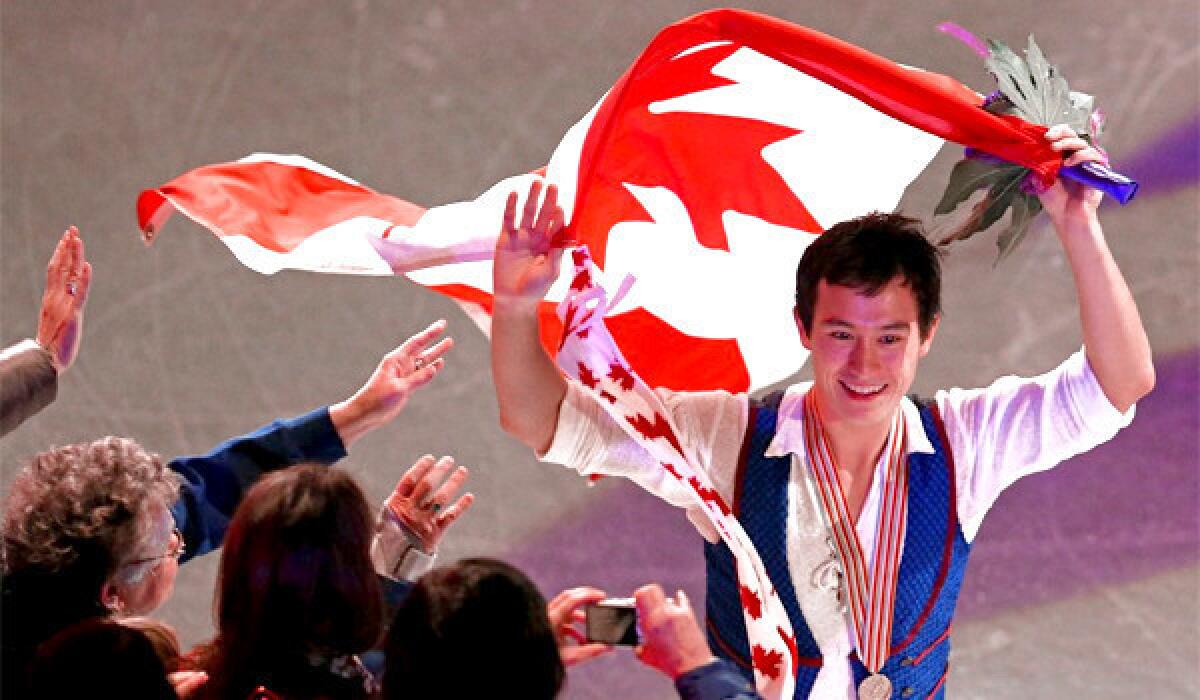‘Chanflation’ helps Patrick Chan keep world skating title

- Share via
LONDON, Canada — The first sellout crowd at the World Figure Skating Championships got what it came for, a victory by the national homey, Patrick Chan.
But his performance as Rodolfo, the poet in the opera “La Boheme,” wasn’t much to write home about.
Unless, of course, someone wanted to add another chapter to the voluminous history of questionable judging in figure skating.
Only the near seven-point lead Chan built in the short program and a dose of home-cooked “Chanflation” allowed the Canadian to win his third straight men’s world title and prevent Denis Ten of Kazakhstan from a triumph that would have made him one of the most surprising champions in history.
The history that was made included the first world medals for Kazakhstan and Spain, whose Javier Fernandez won bronze.
Chan’s score of 267.78 left him with a margin of 1.3 over Ten, who trains in California with coach Frank Carroll. Ten was first in the free skate, and if the 19-year-old had not doubled a triple flip jump late in his program, he would have had the points needed to win.
“I’m sorry I didn’t get to do a good program,” Chan told the audience at Budweiser Gardens. “I wanted to do it so badly.
“It’s a two-program competition, and I’m thankful for the beautiful short program I did Wednesday. Maybe I’m just saving it for the Olympics.”
Chan started Friday’s free skate just as beautifully, nailing a quad-triple jump combination followed by another quad. Then it began to unravel, with falls on successive triple jumps, a lutz and an axel, and a step out on the landing of another.
Despite all that, the judges gave Chan an aggregate 9.11 for skating skills, easily the best of anyone in the competition. His component scores were 2.12 better than Ten, who did a quad and two triple axels amid a spirited, funny and polished interpretation of music from the film “The Artist.”
The argument that skating skills reflect more than jumps rings as hollow as ever. So does the idea that Chan’s performance/execution component score could be within three-tenths of Ten’s, unless you get credit for being a human Zamboni.
U.S. champion Max Aaron wound up a solid seventh in his world debut. Teammate Ross Miner slogged into 14th, leaving the two far from the combined finish (13) needed to gain a third Olympic spot. That means the U.S. will have just two men at the 2014 Winter Games in Sochi, Russia, for the first time since 1998 and only the fourth time since World War II.
Only a year ago, Aaron was ready to quit the sport, convinced the judges never would like a style he called “maybe a little rough around the edges and aggressive.” The former hockey player skates so hard and fast he ran into the boards after landing one jump.
“I’m one of those guys who keeps working real hard and nothing really happens,” Aaron said. “I felt like that was my life. [Now] I got the opportunity, and I’ll run with it.”
Ten, whose family is part of a large Korean population in Kazakhstan, has been battling injuries all season. Surprised by finishing second Wednesday in the short program, with little confidence in a free skate that had been a constant struggle, he adopted a nothing-to-lose attitude by imagining he already had.
He said he told himself, “Imagine you already lost and you need to skate with freedom,” Ten said. “That was my mental strength. I am glad I could skate with power. I didn’t sleep well these last two nights. I was too nervous. I never thought I would finish the season this way.”
Chan, first to win three straight titles since Russia’s Alexei Yagudin from 1998 to 2000, admitted the falls wore him down.
“The more you fall, the more tired you are,” he said.
Especially since the first fall shook him.
“The lutz scared me,” he said. “I lost momentum.”
But not the title. That’s the tired, old story in figure skating.
Russians Tatiana Volosozhar and Maxim Trankov delivered a free skate of surpassing brilliance that made them 20-point winners in the pairs competition with a world-record total score of 225.71.
They are the first Russian world champions since 2005 in a discipline their country once utterly dominated, winning 12 straight Olympic golds from 1964 through 2006.
The U.S. saved its two pairs spots when Alexa Scimeca and Chris Knierim finished ninth, while reigning U.S. champions Marissa Castelli and Simon Shnapir were 13th in the 18-pair field.
More to Read
Go beyond the scoreboard
Get the latest on L.A.'s teams in the daily Sports Report newsletter.
You may occasionally receive promotional content from the Los Angeles Times.







